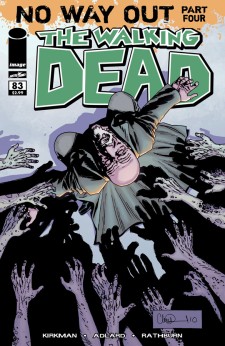 When Robert Kirkman released the first issue of The Walking Dead in 2003, many groaned at the idea of yet another zombie apocalypse. Fans of the undead dared this new comic to live up to predecessors, such as the work of George Romero, Max Brooks and the Resident Evil series. And boy, did it. Now eight years later, The Walking Dead has 85 issues under its belt, has an Eisner and is set to premiere its second season on television in October of this year. What is it about this comic in particular that has launched it into the main stream and beyond? Is it our desire to read something that doesn’t involve a grown man in tights? Or is it the overall mystery of the world we thought we knew?
When Robert Kirkman released the first issue of The Walking Dead in 2003, many groaned at the idea of yet another zombie apocalypse. Fans of the undead dared this new comic to live up to predecessors, such as the work of George Romero, Max Brooks and the Resident Evil series. And boy, did it. Now eight years later, The Walking Dead has 85 issues under its belt, has an Eisner and is set to premiere its second season on television in October of this year. What is it about this comic in particular that has launched it into the main stream and beyond? Is it our desire to read something that doesn’t involve a grown man in tights? Or is it the overall mystery of the world we thought we knew?
One of the main reasons for The Walking Dead’s prosperity is the characters. They have evolved from two-dimensional sketches on a page to people that you care about. You have compassion for these peoples well being and hope to everything that they don’t become dinner. Kirkman’s genius response to this character love is killing them off. He has professed more than once that readers shouldn’t become to attached to anyone because they can be gone by the next page. The recently wrapped up story arc “No Way Out†holds the tagline “When the walls come down…No one is safe” and holy cow, were they true to their word. The inhabitants of The Walking Dead world had been living amongst a gated community, where they now called home. In this story arc, things get shaken up and in issue 83 an unexpected blow came to characters and readers alike. With emotional and physical well being hanging in the balance, it is hard to believe it’s going to be another month to find out what happens next.
In addition to character development ( or departure), The Walking Dead has an ongoing theme that most comics today lack: mystery. Not a “whodunit†type mystery, but when reading page after page, issue after issue, you feel that you have your mind wrapped around the entire story. That is until you look deeper into some basic “information.” For instance, one of the main characters, that has been in just about every issue since her appearance, has “no past.” We know nothing of where she came from, and yet we trust her despite her occasional moments of psychological lapses (there has been more than one instance where she has been caught arguing with herself).
Hell, they are 84 issues and we have no idea what caused the outbreak. In the grand scheme of things you only know a fraction of what’s going on. And that’s OK. It doesn’t ruin the story, it fuels it. It throws the “hero here to save the day†cliche out the window, and let’s us as readers contemplate what we would do if faced with disaster. Do you go the noble route and save everyone? Or is it every person for themselves?
This series can only get better. With no end in sight, lovers of zombies and change alike, have hopes that The Walking Dead style stories will influence a wave of something new. Something that could be an impact the way Captain America and Spider-man did. Although the idea maybe different, the resulting consequence will be the same: extraordinary.

Leave a Reply